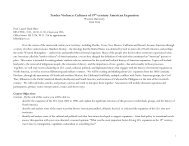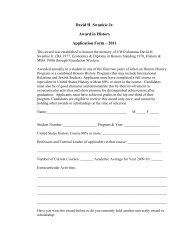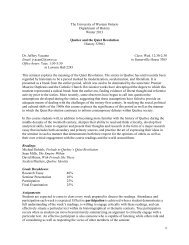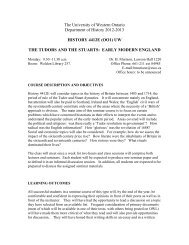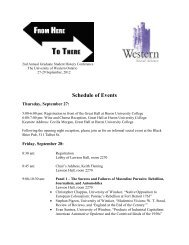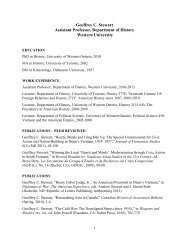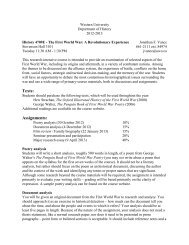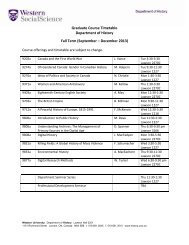Syllabus - History - University of Western Ontario
Syllabus - History - University of Western Ontario
Syllabus - History - University of Western Ontario
You also want an ePaper? Increase the reach of your titles
YUMPU automatically turns print PDFs into web optimized ePapers that Google loves.
Fall-Winter 2011-12 – UWO <strong>History</strong> Department<br />
Wednesday Lectures – 9:30-11:30 a.m.<br />
Pr<strong>of</strong>essor Shelley McKellar<br />
Office: Lawson Hall 2227 Office Telephone: 519-661-2111 ext. 84990<br />
Email: smckell@uwo.ca Office Hours: Wednesdays 12 noon to 2 p.m.<br />
Course Description:<br />
Has disease altered history? How have different societies, at different times, responded to<br />
disease prevention and outbreaks? This course focuses on the role <strong>of</strong> disease in history, examining how<br />
disease swept through cities, devastated populations, and transformed politics, public health and<br />
economies. Spanning the globe and ranging in time period from antiquity to present day, this course<br />
surveys medicine and society’s experience with, understanding <strong>of</strong>, and response to specific diseases,<br />
such as the plague, leprosy, cholera, smallpox, tuberculosis, influenza, HIV-AIDS and SARS. Several<br />
historical approaches will be emphasized in this course, including disease as a causative agent <strong>of</strong><br />
change, disease as a mirror reflecting social processes, and disease as a way <strong>of</strong> illustrating theories and<br />
practices concerning health and medicine. Issues <strong>of</strong> class, race, gender, ethnicity, and sexuality will<br />
certainly be discussed.<br />
Lectures will focus not just on a narrative account <strong>of</strong> events, but will also consider historical<br />
interpretation, contrasting points <strong>of</strong> view, as well as methods and theories used by historians to gather<br />
and evaluate historical evidence. How do historians know what they know about the past? Students will<br />
be encouraged to investigate history through a variety <strong>of</strong> primary sources throughout this course.<br />
This course is open to all students. <strong>History</strong> students, students planning to major in science or<br />
medicine, or other students in the social sciences, health sciences, or arts and humanities are welcome.<br />
Students do not need a background in science, medicine or even history to take this survey course.<br />
Course Expectations and Outcomes:<br />
By the end <strong>of</strong> this course, students should be able:<br />
To appreciate the role played by disease in shaping the past;<br />
To understand that society’s understanding and responses to specific diseases are<br />
shaped by place and time;<br />
To understand some <strong>of</strong> the methodologies and approaches involved in investigating<br />
disease in history;<br />
To analyze critically various source materials – both primary and secondary sources –<br />
from which to understand disease in history;<br />
To formulate and communicate an effective argument, demonstrating good research and<br />
writing skills;<br />
To use (possibly) historical analysis to discover useful perspectives on the continuing<br />
challenges <strong>of</strong> disease in our world today.<br />
1
Date Lecture Topic Textbook<br />
Reading<br />
Online<br />
Discussion<br />
Fall Term<br />
J.N. Hays, The Burdens<br />
<strong>of</strong> Disease (2009)<br />
WebCT<br />
Sep 14 Introduction n/a No discussion posting<br />
Sep 21 What is Disease? Introduction (1) Disease Ideas:<br />
Sep 28 Ancient Egyptian and Greek Ideas about<br />
Chapter 1<br />
Disease<br />
Oct 05 Plague in the Ancient World Chapter 1<br />
Oct 12 Disease in the Middle Ages: Medicine and<br />
Faith<br />
Chapter 2<br />
Oct 19 The Black Death in Europe and the Middle Chapter 3<br />
East, 1347-1350<br />
Oct 26 Disease <strong>of</strong> Exclusion: Leprosy and<br />
Chapter 2<br />
Lepers<br />
Nov 02 New World Peoples, Old World Diseases,<br />
Chapter 4<br />
1492-1650<br />
Nov 09 New Diseases in Europe: Syphilis,<br />
Chapter 4<br />
Typhus and the Sweating Sickness<br />
Nov 16 The Great Plague <strong>of</strong> London, 1665 n/a<br />
Lovesickness as a<br />
Disease?<br />
(2) The Medieval Physician:<br />
Complementary or<br />
Contradicting Images?<br />
(3) Japanese Leprosy<br />
Control Policies:<br />
Necessary or Stigmatizing?<br />
(4) Importing Disease: How<br />
Best to Control the<br />
Exchange <strong>of</strong> Pathogens?<br />
Nov 23<br />
Midterm Test<br />
Nov 30<br />
Dec 07<br />
Disease and the Enlightenment: Science,<br />
Smallpox and Scurvy<br />
Disease and the Body: Challenge and<br />
Change<br />
Chapters 5, 6<br />
Chapters 5, 6<br />
(5) The Human Genome<br />
Project: Science at its Best<br />
or Super Problem?<br />
Winter Term<br />
Jan 11 Workshop: Researching and Writing a<br />
n/a<br />
<strong>History</strong> Paper<br />
No discussion posting<br />
Jan 18 Disease and Imperialism: Tropical<br />
Chapter 9<br />
Diseases<br />
Jan 25 Cholera and Sanitary Reform Chapter 7 (6) Haiti’s Cholera<br />
Outbreak: A Humanitarian<br />
Disaster?<br />
Feb 01 Tuberculosis and Poverty Chapter 8<br />
Feb 08 Coercion and Resistance: Plague in India Ch 9, pp.198-201 (7) Plague in India: A<br />
Feb 15<br />
Feb 22<br />
Feb 29<br />
Mar 07<br />
Mar 14<br />
Mar 21<br />
Venereal Disease: Medical and Policy<br />
Changes<br />
Reading Week<br />
Killer Flu: The Influenza Pandemic <strong>of</strong><br />
1918<br />
Influenza Epidemics and Pandemics after<br />
1918<br />
Fighting Disease with Technology:<br />
Instruments, Machines and Hospitals<br />
Controlling Infectious Diseases: Vaccines<br />
and the Public Debate<br />
2<br />
Ch 11, pp.259-265<br />
Ch 11, pp.273-279<br />
n/a<br />
n/a<br />
Ch 10, pp. 234-242;<br />
Ch 12, pp.283-295;<br />
Medical Dilemma or<br />
Cultural Clash?<br />
(8) Influenza <strong>of</strong> 1918 and<br />
2009: Was <strong>History</strong><br />
Repeating Itself?<br />
(9) The Vaccine War:<br />
Beyond Medical Risks vs.<br />
Benefits?<br />
Ch 11, pp. 266-273<br />
Mar 28 The End <strong>of</strong> Infectious Diseases? The<br />
Ch 11, pp. 253-259<br />
Antibiotic Revolution<br />
Apr 04 HIV-AIDS and Global Implications Ch 12, pp.295-313 (10) Fighting HIV-AIDS in<br />
Apr 11 SARS: Making <strong>History</strong> or Repeating<br />
n/a Africa: Government or<br />
<strong>History</strong>?<br />
Cultural Barriers?
Course Texts:<br />
J.N. Hays, The Burdens <strong>of</strong> Disease: Epidemics and Human Response in <strong>Western</strong> <strong>History</strong> (New<br />
<br />
Brunswick, New Jersey: Rutgers <strong>University</strong> Press, 2009, Revised Edition)<br />
Mary Lynn Rampolla, A Pocket Guide to Writing in <strong>History</strong> (Bedford/ St. Martin’s, 2010) 6 th edition<br />
WebCT:<br />
This course utilizes WebCT http://webct.uwo.ca/. Students need to access the WebCT course<br />
site to participate in the online discussion, to view course grades, and to download relevant course<br />
material, including PowerPoint lecture slides and assignment questions. For those students unable to<br />
access this course on WebCT, email the pr<strong>of</strong>essor (smckell@uwo.ca) your UWO userid name (what you<br />
use for your email, etc. at UWO) to verify that you are registered for this course.<br />
Course Evaluation:<br />
Online Discussions (10 topics) ……………..…………. 10 % ……… Approx. every 2 weeks<br />
See posting schedule above<br />
Short Essay Assignment (4-5 pp) ………................ 15 % ……… Oct 12 due<br />
Midterm Test …………………………………….………. 20 % ……… Nov 23 in class<br />
<strong>History</strong> <strong>of</strong> Disease Research Paper (8-10 pp) …..….. 25 % ……… Mar 14 due<br />
Final Exam ……………………………………………….. 30 % ……… April exam period<br />
Online Discussions:<br />
Online student discussion will be based on discussion topics posted by the pr<strong>of</strong>essor to the<br />
WebCT discussion board throughout this course. Topics related to course themes and lectures will be<br />
posted for a limited time (approximately 2 weeks) for online class discussion. Only one topic will be<br />
open for comment at a time; new topics will replace the older ones. The onus is on the student to<br />
participate in this online discussion. Students are to post their own position and/or commentary to the<br />
topic and are encouraged to respond to the comments <strong>of</strong> other students as well.<br />
These discussion postings will be marked qualitatively, based on thoughtfulness, originality,<br />
ability to interact with other postings, and ability to relate to course themes. Students are encouraged to<br />
post multiple comments on any one topic, demonstrating their reading and engagement with the online<br />
discussion. So comment on your peers’ responses! Note that redundant comments however will not<br />
earn marks. Also any online postings on the discussion board construed as “flaming” or inappropriate will<br />
automatically result in a zero participation grade for that student, and may be brought to the attention <strong>of</strong><br />
the Department Chair for possible further action.<br />
Short Essay Assignment (4-5 pp) – Thucydides and the Plague <strong>of</strong> Athens, 430-426 B.C.<br />
Using the primary source <strong>of</strong> Thucydides’ account on the plague, students will answer the<br />
following:<br />
How does Thucydides present the plague, and why? Is this a valid source for<br />
historians to understand the Plague in Athens, 430-426 B.C. – why or why not?<br />
The primary source as well as three secondary sources (optional to use) will be available on the WebCT<br />
course site. Turnitin.com and late penalties apply to this assignment (see below).<br />
3
<strong>History</strong> <strong>of</strong> Disease Research Paper (8-10 pp)<br />
Students will write an 8 to 10 page history essay on the impact <strong>of</strong> a particular disease in history.<br />
The assignment is open to meet the interests <strong>of</strong> the students. Students do not need to feel restricted by<br />
time period or place, but they do need to address the question <strong>of</strong> impact and/or influence <strong>of</strong> a particular<br />
disease on a particular group <strong>of</strong> people at some specific time and place. A history research paper is an<br />
argument with a thesis supported by evidence. That is, work on your research paper should begin<br />
with a good analytical question to frame an argument that is backed up by good research (be careful not<br />
to fall in the descriptive trap).<br />
On January 11, we shall spend the class discussing how best to research and write a history<br />
paper, and in this case a history <strong>of</strong> disease paper. We shall discuss what makes a good analytical paper<br />
verses the “descriptive trap” essay, how best to research a history <strong>of</strong> disease topic, and what constitutes<br />
best writing practices. Common pitfalls in essay research and writing will be discussed. At that class, a<br />
list <strong>of</strong> history <strong>of</strong> disease questions shall be distributed, and students may choose one <strong>of</strong> these questions<br />
for their paper, or choose their own topic. If students pursue another topic not on the list, consult with the<br />
pr<strong>of</strong>essor to get approval. Please plan on attending this class on January 11 as it will serve you well<br />
for the assignment.<br />
Submitting Your Written Work ---<br />
Turnitin.com – a commercial plagiarism detection s<strong>of</strong>tware under license to the<br />
<strong>University</strong> for the detection <strong>of</strong> plagiarism. All papers submitted for such<br />
checking will be included as source documents in the reference database for<br />
the purpose <strong>of</strong> detecting plagiarism <strong>of</strong> papers subsequently submitted to the<br />
system.<br />
You must submit a paper copy <strong>of</strong> your work (both the short essay assignment<br />
AND the history <strong>of</strong> disease research paper) in class on the due date. In<br />
addition, you must submit an identical electronic copy to Turnitin.com which<br />
is available via the WebCT coursepage.<br />
Please note that failure to submit your essay to turnitin.com will result in a 0<br />
grade, even if a paper copy has been submitted. The submission date <strong>of</strong> the<br />
paper copy <strong>of</strong> your essay (not the turnitin.com date) will determine if a late<br />
penalty will be applied or not.<br />
Plagiarism – Scholastic <strong>of</strong>fenses are taken seriously and students are directed to read<br />
the appropriate policy, specifically, the definition <strong>of</strong> what constitutes a<br />
Scholastic Offence, at the following web site:<br />
http://www.uwo.ca/univsec/handbook/appeals/scholastic_discipline_undergrad.pdf<br />
Late Penalties – Penalty for late essays is 2% each day after the due date. Essays<br />
are to be handed to the pr<strong>of</strong>essor in class or before the end <strong>of</strong> business <strong>of</strong><br />
the due date. Late essays can be submitted to the <strong>History</strong> Office located at<br />
SSC 4328 to be date stamped. Faxed and emailed essays are not acceptable.<br />
Essays slipped under pr<strong>of</strong>essor’s <strong>of</strong>fice door are also not acceptable.<br />
Extensions may be granted if legitimate circumstances are presented by the<br />
student to the pr<strong>of</strong>essor well in advance <strong>of</strong> the due date. Poor work planning<br />
(such as “I have XX other papers due”) is not grounds for an extension.<br />
4
Please note that after 7 days (one week past the due date), the assignment will not be<br />
accepted.<br />
Students needing accommodation should visit the Social Science Academic Counselling<br />
Office, Social Science Centre, Rooms 2105, 2114.<br />
For medical accommodation, please see the Policy on Medical Illness<br />
( http://www.uwo.ca/univsec/handbook/appeals/accommodation_medical.pdf )<br />
posted on the UWO Students Services website at<br />
https://studentservices.uwo.ca/secure/index.cfm<br />
Midterm Test (In-class) – See “What do I study?” slides on course WebCT page<br />
The midterm test will take place in class. Students are responsible for course material covered in<br />
lectures, assignments and online discussions up to the date <strong>of</strong> the midterm test. The midterm test will<br />
consist <strong>of</strong> two parts.<br />
Part I – Identification and Significance -- will consist <strong>of</strong> identification and significance questions<br />
taken from the list <strong>of</strong> terms, events and names provided on each class lecture outline.<br />
Part II – Short Answer Essay – will consist <strong>of</strong> short answer essay questions based on material<br />
covered in the class lectures.<br />
Final Exam (2 hours) – See “What do I study?” slides on course WebCT page<br />
The final exam will take place in the April exam period as set by the Registrar’s Office. Students<br />
are responsible for course material covered in the entire course (from September) although the majority<br />
<strong>of</strong> essay questions will focus on material discussed in the second half <strong>of</strong> this course (from January to<br />
April). The final exam will consist <strong>of</strong> three parts.<br />
Part I – Identification <strong>of</strong> Terms/Events/People -- will consist <strong>of</strong> identification and significance<br />
questions taken from the list <strong>of</strong> terms, events and names provided on each class lecture<br />
outline.<br />
Part II – Short Answer Essay – will consist <strong>of</strong> short answer essay questions based on material<br />
covered in the class lectures.<br />
Part III – Long Answer Essay -- will consist <strong>of</strong> identification and significance questions taken from<br />
the list <strong>of</strong> terms, events and names provided on each class lecture outline.<br />
5
Grading <strong>of</strong> a <strong>History</strong> Essay: What Does Each Grade Mean? <br />
Essays are graded according to content (what is said) and style (how it is said). Points in content include<br />
a familiarity with the material, the incorporation <strong>of</strong> examples to illustrate or support the argument, and<br />
identification and analysis <strong>of</strong> the issues. Points in style include basic grammar and spelling. Style also<br />
includes sentence and paragraph structure, vocabulary, and organization. Organization includes a strong<br />
introduction, a clear thesis, a logical organization <strong>of</strong> the points to be argued, and an eloquent conclusion.<br />
Descriptive remarks <strong>of</strong> each grade level assigned to essays have been compiled below.<br />
A Grade Paper<br />
A paper <strong>of</strong> this level displays a solid understanding <strong>of</strong> the information and the context in<br />
which it is presented. It demonstrates reflection and thought, expressed fluently, and<br />
written with a style distinguished by its freshness and clarity. The argument is sound,<br />
substantive, organized, and uses the sources effectively. One is impressed by the<br />
author’s engagement with the topic, the compelling issues, and their significance and<br />
implications therein.<br />
B Grade Paper<br />
The author demonstrates a substantial knowledge <strong>of</strong> the information and context<br />
associated with the subject. The paper is well-written and presented with no serious<br />
flaws, a good use <strong>of</strong> sources and a clear thesis. The argument is above average in<br />
organization and analysis and brings in points to support the thesis. The conclusion is<br />
fine but could be more compelling or forceful. Generally, the paper is competent but not<br />
extraordinary.<br />
C Grade Paper<br />
The author demonstrates an acceptable grasp <strong>of</strong> the material and awareness <strong>of</strong> the<br />
sources. The organization is logical and the style follows proper form, although there<br />
may be some lapses in each aspect. The paper would be best described as descriptive<br />
because it lacks any substantial analysis, and demonstrates a modest ability to work with<br />
the material critically. One senses the author does not fully understand the issues <strong>of</strong> the<br />
subject because the ideas are superficial, undeveloped, and/or tend to stray from the<br />
subject. The argument needs to be tighter, and the writing strengthened through editing.<br />
D Grade Paper<br />
The author shows a familiarity with the subject, but not an understanding <strong>of</strong> it. He or she<br />
lacks the writing or communication skill to intelligibly relate what knowledge has been<br />
comprehended. The paper is disorganized, lacks structure, and the ideas are<br />
undeveloped. There is no evidence <strong>of</strong> substantial thought or reflection.<br />
F Grade Paper<br />
The author is without any writing skill. Grammar and spelling errors dominate and<br />
disguise the lack <strong>of</strong> organization. The ideas are unrelated to the subject and reveal a<br />
complete misunderstanding <strong>of</strong> the task.<br />
Taken from the Resource Guide for Teaching and Marking in <strong>History</strong>, published by the Canadian Historical Association, pp.26-28.<br />
6
Please contact the course instructor if you require material in an alternate format or if<br />
you require any other arrangements to make this course more accessible to you. You<br />
may also wish to contact Services for Students with Disabilities (SSD) at 661-2111 x<br />
82147 for any specific question regarding an accommodation.<br />
THE UNIVERSITY OF WESTERN ONTARIO<br />
FACULTY OF SOCIAL SCIENCE<br />
PLAGIARISM<br />
Students must write their essays and assignments in their own words. Whenever students take<br />
an idea, or a passage from another author, they must acknowledge their debt both by using quotation<br />
marks where appropriate and by proper referencing such as footnotes or citations. Plagiarism is a<br />
major academic <strong>of</strong>fense (see Scholastic Offence Policy in the <strong>Western</strong> Academic Calendar).<br />
All required papers may be subject to submission for textual similarity review to the<br />
commercial plagiarism detection s<strong>of</strong>tware under license to the <strong>University</strong> for the detection <strong>of</strong><br />
plagiarism. All papers submitted will be included as source documents in the reference database for<br />
the purpose <strong>of</strong> detecting plagiarism <strong>of</strong> papers subsequently submitted to the system. Use <strong>of</strong> the<br />
service is subject to the licensing agreement, currently between The <strong>University</strong> <strong>of</strong> <strong>Western</strong> <strong>Ontario</strong><br />
and Turnitin.com (http://www.turnitin.com).<br />
The following rules pertain to the acknowledgements necessary in academic papers.<br />
A. In using another writer's words, you must both place the words in quotation marks and<br />
acknowledge that the words are those <strong>of</strong> another writer.<br />
You are plagiarizing if you use a sequence <strong>of</strong> words, a sentence or a paragraph taken from<br />
other writers without acknowledging them to be theirs. Acknowledgement is indicated either<br />
by (1) mentioning the author and work from which the words are borrowed in the text <strong>of</strong> your<br />
paper; or by (2) placing a footnote number at the end <strong>of</strong> the quotation in your text, and<br />
including a correspondingly numbered footnote at the bottom <strong>of</strong> the page (or in a separate<br />
reference section at the end <strong>of</strong> your essay). This footnote should indicate author, title <strong>of</strong> the<br />
work, place and date <strong>of</strong> Publication and page number. Method (2) given above is usually<br />
preferable for academic essays because it provides the reader with more information about<br />
your sources and leaves your text uncluttered with parenthetical and tangential references. In<br />
either case words taken from another author must be enclosed in quotation marks or set <strong>of</strong>f<br />
from your text by single spacing and indentation in such a way that they cannot be mistaken<br />
for your own words. Note that you cannot avoid indicating quotation simply by changing a<br />
word or phrase in a sentence or paragraph which is not your own.<br />
B. In adopting other writer's ideas, you must acknowledge that they are theirs.<br />
You are plagiarizing if you adopt, summarize, or paraphrase other writers' trains <strong>of</strong> argument,<br />
ideas or sequences <strong>of</strong> ideas without acknowledging their authorship according to the method<br />
<strong>of</strong> acknowledgement given in 'At above. Since the words are your own, they need not be<br />
enclosed in quotation marks. Be certain, however, that the words you use are entirely your<br />
own; where you must use words or phrases from your source; these should be enclosed in<br />
quotation marks, as in 'A' above.<br />
7
Clearly, it is possible for you to formulate arguments or ideas independently <strong>of</strong> another writer<br />
who has expounded the same ideas, and whom you have not read. Where you got your ideas<br />
is the important consideration here. Do not be afraid to present an argument or idea without<br />
acknowledgement to another writer, if you have arrived at it entirely independently.<br />
Acknowledge it if you have derived it from a source outside your own thinking on the<br />
subject.<br />
In short, use <strong>of</strong> acknowledgements and, when necessary, quotation marks is necessary to<br />
distinguish clearly between what is yours and what is not. Since the rules have been<br />
explained to you, if you fail to make this distinction, your instructor very likely will do so for<br />
you, and they will be forced to regard your omission as intentional literary theft. Plagiarism is<br />
a serious <strong>of</strong>fence which may result in a student's receiving an 'F' in a course or, in extreme<br />
cases, in their suspension from the <strong>University</strong>.<br />
MEDICAL ACCOMMODATION<br />
The <strong>University</strong> recognizes that a student’s ability to meet his/her academic responsibilities may, on<br />
occasion, be impaired by medical illness. Please go to<br />
https://studentservices.uwo.ca/secure/medical_accommodations_link_for_OOR.pdf to read about the<br />
<strong>University</strong>’s policy on medical accommodation. Please go to<br />
http://www.uwo.ca/univsec/handbook/appeals/medicalform.pdf to download the necessary form. In<br />
the event <strong>of</strong> illness, you should contact Academic Counselling as soon as possible. The Academic<br />
Counsellors will determine, in consultation with the student, whether or not accommodation is<br />
warranted. They will subsequently contact the instructors in the relevant courses about the<br />
accommodation. Once a decision has been made about accommodation, the student should contact<br />
his/her instructors to determine a new due date for term tests, assignments, and exams.<br />
If you have any further questions or concerns please contact, Rebecca Dashford,<br />
Undergraduate Program Advisor, Department <strong>of</strong> <strong>History</strong>, 519-661-2111 x84962 or<br />
rdashfo@uwo.ca<br />
8



